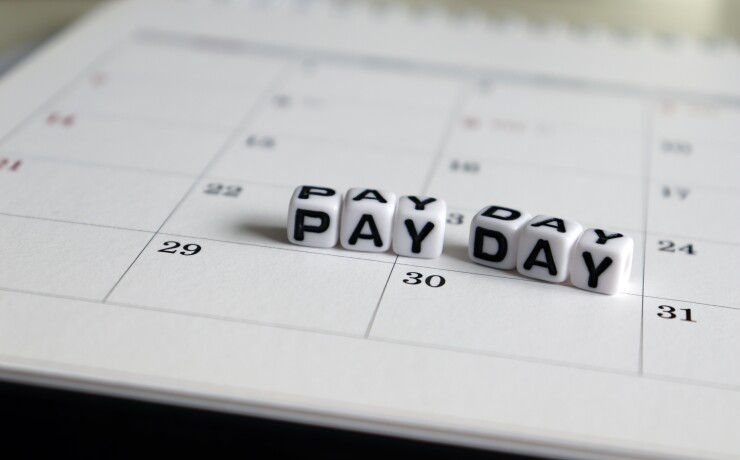
Earned wage access products — which enable cash-strapped consumers to access part of their paycheck early — have become a hotbed of fintech innovation, underscoring the need for appropriate regulations, according to a recent study from Harvard University researchers.
Rules are needed in the largely unregulated EWA arena to protect consumers from escalating abuses, Harvard's researchers say. But regulators should tread carefully to avoid stifling development in the evolving industry, according to a recent paper authored by Marshall Lux and Cherie Chung of the Mossavar-Rahmani Center for Business and Government at the Harvard Kennedy School of Government.
"The nascent nature of the [EWA] industry suggests that more research is needed before further and more far-reaching policies are introduced, to prevent premature limitations on potential innovations and benefits from EWA," the researchers wrote.
Millions of consumers regularly use EWA products that are offered by fintechs, employers and through payroll service providers, who tout EWA as a way to retain workers, according to the paper.
The introduction of
Most EWA providers earn revenue from charging a subscription fee or other fees for instant access to wages ahead of payday (versus waiting a day or two for the funds to arrive free via ACH). Many EWA providers also earn revenue when users spend EWA funds through associated debit cards that generate card network interchange.
EWA apps generally enable users to access up to 50% of their wages at least a week in advance, which can be a boon in emergencies. And many EWA providers charge a fee of about $2 to $5 for each wage advance, which can equate to triple-digit APRs of a payday loan for frequent users.
In a national survey of more than 1,000 low-income U.S. consumers the paper's authors conducted in June, 42% of EWA users said they no longer use payday loans. About half of respondents who use an EWA service said they tap it at least once a month to cover routine and unexpected expenses. Some respondents said they have used multiple EWA services at once.
A few states have already taken regulatory action on EWA, which could lead to a
The California Department of Financial Protection and Innovation found in a 2021 market study that the average APR across six million EWA transactions was more than 330%, driving the DFPI to propose introducing interest and rate limits for EWA to conform with California's loan-finance laws. The state aims to finalize its EWA regulations no later than March 2024.
Other states are leaning in a different direction. Nevada and Missouri recently passed laws that require EWA providers to obtain a license and clearly disclose fees to consumers, with both states specifying that wage advances expressly are not loans.
Although the Consumer Financial Protection Bureau said in a 2020 advisory opinion that EWA products aren't loans or credit products subject to the Truth in Lending Act, the agency has not yet formally proposed rules covering EWA industry.
In their paper, the Harvard researchers said the CFPB's timeline to take action on EWA is unclear. But they recommended in their paper that any national regulations covering EWA should cap the total amount of fees or subscriptions users pay monthly to access wages early. They also suggest that EWA firms should provide clear and transparent disclosures about fees and add mechanisms to promote financial wellness.
The Harvard researchers also frown on the practice of EWA providers like
"Consumers who live paycheck-to-paycheck often are vulnerable and not in a position to accurately evaluate the long-term cost of paying a fee versus a tip, and the language around tips and fees in general is confusing within many EWA apps," said Lux, in an interview.
As regulators methodically contemplate rules to protect EWA users, competition and innovation within the EWA arena are already driving healthier options for users, the Harvard researchers noted.
One example is
"We're advancing funds to users through a national bank under a lending program because we see it as an advance, which covers us through all the appropriate disclosures and protections that already are in place for loans," said Nico Simko, Clair's founder and CEO, in an interview.
Instead of charging fees to consumers or employers for wage advances, Clair earns 1% net revenue through the associated Mastercard debit card, amounting to about $10 per customer per month, Simko said.
Like a growing number of other EWA providers, Clair users are not required to deposit 100% of their paycheck to the associated EWA account to get free instant access to their wages; users need only allocate $200 of their paycheck to the Clair account to access those wages at any time.
Clair primarily markets its services to employers through payroll providers, but recently added a program to create partnerships directly with employers. On July 6, Clair announced a $25 million infusion of venture capital funding, bringing the total it's raised since 2020 to $45 million.
Minneapolis-based Branch is another EWA provider whose business model is morphing. Branch's focus in the last two years has shifted from primarily offering EWA services to providing employers with a menu of options to disburse pay to gig and contract workers, said Branch CEO Atif Siddiqi.
As of last fall, Branch provides the instant wage payout service Uber offers its drivers, and many restaurants use Branch's platform to pay restaurant workers' tips they earn after each shift.
Last month, the eight-year-old firm launched Branch Direct, a web portal enabling workers at participating employers to receive instant wage payouts to an existing bank account via a connected Branch debit card.
"Even though we work through employers via a business-to-business model, our goal is to let workers decide when they want to get paid, and how they want funds delivered, and into which of their accounts. We're looking to add support for FedNow, in addition to ACH and push-to-card," Siddiqi said.





